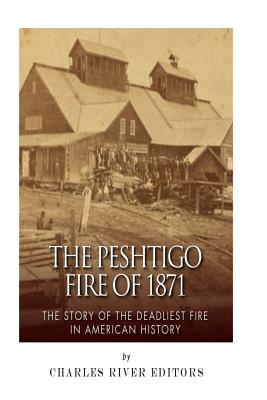*Includes witness accounts of the fire
*Includes a bibliography for further reading
"Why is this story not known? You see endless stories about Johnstown. What happened at Peshtigo makes Johnstown look like a birdbath." - Bill Lutz, co-author of Firestorm at Peshtigo
"The air burned hotter than a crematorium and the fire traveled at 90 mph. I read an account of a Civil War veteran who had been through some of the worst battles of the war. He described the sound - the roar - during the fire as 100 times greater than any artillery bombardment." - Bill Lutz
In arguably the most famous fire in American history, a blaze in the southwestern section of Chicago began to burn out of control on the night of October 8, 1871. It had taken about 40 years for Chicago to grow from a small settlement of about 300 people into a thriving metropolis with a population of 300,000, but in just two days in 1871, much of that progress was burned to the ground.
Due to the publicity generated by a fire that reduced most of a major American city to ash, the Peshtigo Fire of 1871 might fairly be called America's forgotten disaster. Overshadowed by the much better covered and publicized Great Chicago Fire that occurred on the same evening, the fire that started in the Wisconsin logging town of Peshtigo generated a firestorm unlike anything in American history. In addition to destroying a wide swath of land, it killed at least 1,500 people and possibly as many as 2,500, several times more than the number of casualties in Chicago. While people marveled at the fact that the Great Chicago Fire managed to jump a river, the Peshtigo fire was so intense that it was able to jump several miles across Green Bay. While wondering aloud about the way in which the Peshtigo fire has been overlooked, Bill Lutz noted, "Fires are normally very fascinating to people, but people seem resistant to Peshtigo. Maybe Peshtigo is on such a large scale that people can't comprehend it."
Ironically, while Peshtigo is widely forgotten, the fire there is often cited as proof that the Great Chicago Fire was caused by natural phenomena, such as a comet or meteor shower. Those advocating such a theory think it's too coincidental that such disastrous fires were sparked in the same region on the same night, and they point to other fires across the Midwest. Of course, as with the Great Chicago Fire, contemporaries of the Peshtigo fire faulted human error and didn't necessarily link the two fires, if only because fires were a common problem in both Peshtigo and Chicago during the 19th century.
The Peshtigo Fire of 1871 chronicles the story America's deadliest fire. Along with pictures of important people, places, and events, you will learn about the Peshtigo fire like never before, in no time at all.
